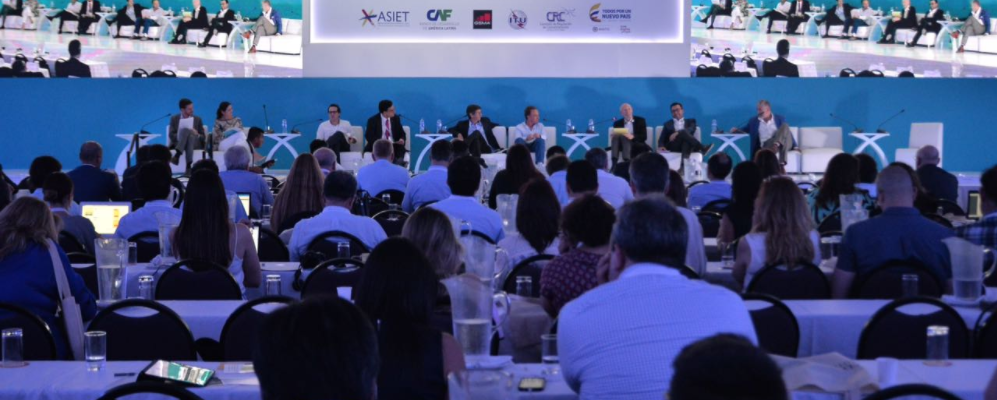
The players of the Latin American Digital Ecosystem highlight the need for public policies that promote development of the digital economy
Cartagena, Colombia. Latin America’s economic future will be a digital one or they will have no future, ministers agreed, so did regulators and telecom operators, internet companies, consultants and specialist gathered at the 5th Latin American Telecommunications’ Congress (CLT 2017).
Public Policies
During the inaugural event Colombia’s Information and Communication Technology Minister (MinTIC), Mr. David Luna, provided the design of a State Public Policy in order to push Colombia’s digital economy and its productive processes.
“MinTIC” and the Communication’s and Regulatory Commission (i.e. the CRC) shall develop jointly the regulatory projects, strategies and actions (including the Digital Economy Observatory and the centers of excellence on Big Data, Internet of things and Artificial Intelligence), in order to push and measure the digital economy in Colombia so as to impact more economic and social development.
Mr. Germán Darío Arias, expert commissioner and Executive Director of Colombia’s CRC, explained during the Seminar “Strategies to promote the Digital Economy in Colombia”, that the CRC shall redefine the concept of broadband so that as of 2019 the countries’ Internet users shall have a download speed of 25 Mbps, if it is to be called broadband.
During the panel discussion “The role of the State in the Digital Economy”, Columbia University alumnae, Mr. Raúl Katz, explained that the Digital Economy is a new social and economic context for industry that results from massive adoption of Information and Communications’ Technologies (ICT).
In that respect, Mr. Pablo Bello, Executive director of the “Asociación Iberoamericana de Empresas de Telecomunicaciones” (i.e. the Iberian American telecommunication Corporations), warned that digitalizing the economy is currently the most important Public Policy in Latin America and thus it should be based on trust among all stakeholders of the digital ecosystem.
In reference to the broadband definition, which seeks that Colombia has a download speed of 25 Mbps as of 2019 to boost digital economy, Bello pointed out that governments, rather than being concerned about Internet speed, must first seek to close the digital gap.
He underlined that to have ultra-fast broadband, investment in infrastructure is required, as well as confidence in the digital ecosystem and public policies. As for investment, a USD $ 300 billion is required in the next few years to close the digital gap in the region.
Mobile Industry
Mr. Sebastián Cabello, director of GSMA for Latin America, reminded that ICTs are a development instrument. The mobile industry’s contribution to the regional economy reached USD $ 255 billion in 2015, 5 percent of the GDP. This figure is expected to increase and reach 315 by 2020.
In Colombia, the mobile sector contribution meant 10 billion dollars in 2016, according to a new report of GSMA Latin America.
To be able to support and maintain future networks, the emphasis should be on the design of regulatory frameworks that provide certainty and stability, sufficiently, to accompany the explosion of new services and with that, the necessary investment to sustain them. The acceleration of digitalization implies reviewing fiscal burdens and correcting regulatory asymmetries.
Mr. Raúl Katz pointed out that although Public Policies are important, these are not sufficient and there is a lack of accountability from the private corporations to make investments and to digitize productive processes.
The consultant from Telecom Advisory Services pointed out that the main barriers to digital transformation of the industries are the lack of management priorities and human capital and the resistance to change that is not part of the company’s strategy, as well as regulatory concerns, an undefined implementation accountability, lack of coordination between functions, lack of vision with regards to the function that systems have or systems that are not prepared.
During the inaugural event of the CLT 2017, Mrs. Carolina España, Director and Representative in Colombia of the CAF – Development Bank of Latin America – called for a strengthening of the productive apparatus in Colombia with telecommunications infrastructure. She also called for an increase in the telecommunications investment rate and the elimination of the barriers imposed to the digital economy: i.e. obsolescence of regulatory frameworks and the lack of modern Public Policies.
Towards a collaborative data economy
Countries’ regulators, before balancing competition among market participants, must remove the regulatory barriers, said Mr. Arun Sundararajan, Professor of the University of New York and author of The Sharing Economy.
Sundararajan explained that a sharing economy reduces the number of employees required by a digital platform; however, at the same time, it expands the number of partners that can adhere to the business model.
Mr. Daniel Castro, Vice-president of the Information Technology Foundation of the United States, picked-up the role of the State and said that its function is to accelerate digital adoption through the private sector. He also stated that Innovation can accelerate economic growth and that the rise of data economy is transforming the industries.
User data are more than a commodity; they also involve privacy and fundamental rights, pointed out Mr. Carlos López Blanco, Managing Director of Public Affairs and Regulations of Telefónica.
During the debate “The Role of the State in the digital economy”, he emphasized that not all digital economies have a sharing nature. In the digital ecosystem, users continue to be the most important element. He affirmed, “In the digital world, trust is achieved in the digital platforms based on the way users utilize them”.
Convergent regulatory framework
What should be the model regulatory framework for convergence in Latin America? This question brought together regulators, operators, platforms and consultants of the digital economy in Latin America, who agreed on the need to have a convergent regulation that allows all participants of the ICT industry to join the digital economy.
Fran González, analyst of Analysys Mason, emphasized that closing the digital gap will require substantial investments and allocation of spectrums. He warned that the revenue of telecommunications operators has slowed down. He suggested a review of Public Policy and regulation with special focus on the OTT of traditional and new services. The digital economy requires a redesign of the regulatory and institutional framework.
Mr. Santiago Pardo, Vice-president of Regulatory Affairs and Institutional Relations of Claro Colombia, is in favor of competition for infrastructure. He said that currently, the trend is more inclined to sharing rather than investing and competition for infrastructure to Support the applications of the digital economy.
He gathered that regulatory measures should have a temporary nature and be proportionate and that in a digital economy environment, ex ante regulations are not required.
Mr. Robert Pepper, responsible for Facebook’s Global Technology and Connectivity Policy, recognized that companies like Facebook would not exist without connectivity, but that Internet companies generate the demand so that companies pay for the ever-increasing bandwidth.
***
For more Información and in order to register, please visit the official web page of the gathering at http://clt2017.org
Further information at: #CLT17
Twitter of the organizers: @ITU @AgendaCAF @asiet_lat @GSMALatam @CRCCol
Location: Centro de Convenciones, Hotel las Américas. Cartagena, Colombia.































